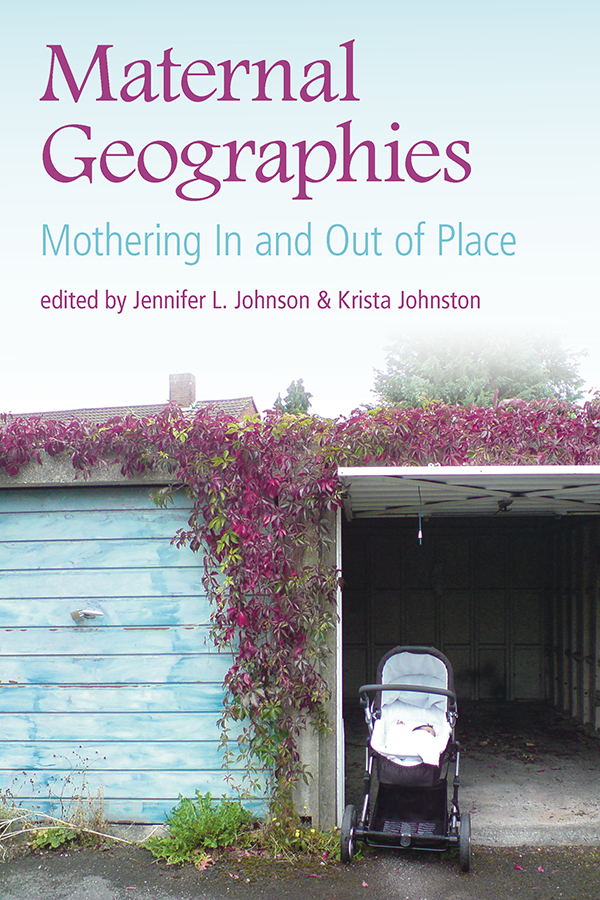
Price: $34.95
Page Count: 240
Publication Date: May 2019
ISBN: 978-1-77258-200-0
This collection broaches the intersections of critical motherhood studies and feminist geography. Contributors demonstrate that an important dimension of the social construction of motherhood is how mothering happens in space and place, leading to the articulation of diverse maternal geographies. Through 16 concise chapters divided into three thematic sections, the contributors provide an account of motherhood and mothering as spatial practices that are embedded in relations of power across time and place. While some contributors explore how dominant discourses of motherhood seek to keep mothers in their place, others take up the notion of maternal geographies as productive in their own right and follow their subjects as they create a new sense of place. Collectively, the authors demonstrate that mothers are produced and regulated as subjects in relation to space and place, and also that practices of mothering produce spatial relationships.
The scholars gathered here bring interdisciplinary approaches from diverse fields including women’s and gender studies, sexuality studies, social geography, sociology, anthropology, fine arts, literary studies, and film studies. Chapters include submissions from authors who reference the geographical contexts of Aotearoa/New Zealand, Argentina, Australia, Brazil, Canada, the Eastern Caribbean, Great Britain, Japan and Samoa, and the United States.
“This book has the capacity to shift our thinking. Specifically, the juxtaposition of thinking about motherhood/maternal theory and feminist geographies is fruitful and allows for a consideration of the literal and figurative spaces of maternity in new ways.”
-May Friedman, Assistant Professor, Ryerson University
“Maternal Geographies is an accessible collection that brings together a diverse set of arguments via engaging styles of presentations. The Editors position the contributions within an interdisciplinary backdrop through which authors detail the spatialities of mothering. Instead of the well-worn trope of mothers facing challenges, each of the authors foregrounds mothering as a process, bringing refreshingly neoteric angles to understanding what mothering is all about. Contributions provide personal accounts of sculpting spaces for conventionally understood as ‘out of place’ mothering, offer novel readings of art forms that bring a sensitivity to the complexity of the lives of women who mother, and advance methodological queries into embodied research practices that extend well beyond the research topic. This reorientation away from the idealizations of mother and motherhood toward mothering as a process will no doubt affect the way researchers approach mothers and motherhood through the practices of mothering.”
-Professor Pamela Moss, University of Victoria
Chapter 1: “Maternal Geographies: Mothering In and Out of Place” by Jennifer Johnson & Krista Johnston
Chapter 2: “Reconstructing ‘Home’ Through Mothering in Japan: A Case of Samoan Wives” by Minako Kuramitsu
Chapter 3: “May: Mothering in Space and Place, Painting and Poem” by Wanda Campbell
Chapter 4: “Mothering, Geography, and Spaces of Play” by Laurel O’Gorman
Chapter 5: “Spatial Practices of Care, Knowledge and Becoming Among Mothers of Children with Autism” by Karen Falconer Al-Hindi
Chapter 6: “A Global Positioning System: On ‘Finding Myself’ as a Mother in the Romantic Landscape” by Elizabeth Philps
Chapter 7: “Good Mothers?: Geographies of Sexualized Labour and Mothering in the Strip Trades in Northern Ontario” by Tracy Gregory and Jennifer Johnson
Chapter 8: “PLACEnta: Finding Our Way Home” by Jules Koostachin
Chapter 9: “Pregnancy, Gender and Career Progression: The Visible Mother in the Workplace” by Danielle Drozdzewski and Natasha Klocker
Chapter 10: “Belly, Baby, Boundaries: The Effect of Pregnancy on Research Relationships” by Shana Calixte
Chapter 11: “Fields of Care: (Auto)ethnography of the Politics of Pregnancy and Foodwork in Aotearoa New Zealand” by Emma Sharp
Chapter 12: “Engineering the Good Mother: A Case Study of Opportunity NYC” by Carolyn Fraker
Chapter 13: “Mothers Out of Place in Argentine Cinema” by Nadia Der-Ohannesian
Chapter 14: “Geographies of Care and Peripheral Citizenship Among Mothers of the Brazilian Bolsa Família Program” by Nathalie Reis Itaboraí
Chapter 15: “‘Parce que sans ça tu les oublies, les chansons…’: Mothering Between Solidarity and Difference Through Francophone Places and Networks in Kingston, ON” by Laurence Simard-Gagnon
Chapter 16: “LGBT Families and ‘Motherless’ Children: Tracking Heteronormative Resistances in Great Britain, Canada, and Australia” by Catherine Nash, Andrew Gorman-Murray and Kath Browne
Jennifer L. Johnson is Associate Professor of Women’s, Gender, and Sexuality Studies at Thorneloe University federated with Laurentian University in Sudbury, Ontario, Canada. Her research and teaching include feminist geographical approaches to the study of social reproduction and global economies; gender, race and racism; and feminist pedagogies. She is co-editor of Feminist Issues: Gender, Race, and Class 6th edition with Nancy Mandell (Pearson Education, 2016).
Krista Johnston is Assistant Professor of Women’s and Gender Studies and Canadian Studies at Mount Allison University, located in Mi’kma’ki, along the Bay of Fundy, New Brunswick, Canada. Her teaching and research focus on the roles and responsibilities of non-Indigenous peoples in projects of decolonization, with a focus on gender justice and urban citizenship.


